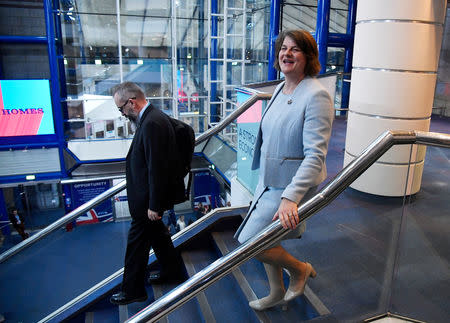Leader of N.Ireland's DUP warns EU's Barnier: you can't annex us

By William James
BIRMINGHAM, England (Reuters) - The European Union cannot be allowed to "annex" Northern Ireland by having it accept different regulations than those that apply in the rest of the United Kingdom, the leader of the province's Democratic Unionist Party (DUP) said on Tuesday.
The DUP's 10 lawmakers prop up British Prime Minister Theresa May's minority Conservative government. Both May and the DUP are committed to leaving the EU next year and to securing an exit agreement that protects a 1998 peace deal that ended decades of sectarian violence in Northern Ireland.
However, Britain and the EU have yet to agree how to avoid a 'hard border' involving physical infrastructure such as customs posts between Northern Ireland and the Irish Repbulic, an EU member, after Brexit. The issue has stalled the exit talks and increased fears that they could fail.
"Northern Ireland is not about to become a semi-detached part of the United Kingdom," DUP leader Arlene Foster told a meeting on Tuesday on the sidelines of the annual Conservative Party conference in the English city of Birmingham.
The EU's Brexit negotiator Michel Barnier has previously suggested keeping Northern Ireland inside the bloc's customs union as a "backstop" solution, effectively creating a border for goods in the Irish Sea between the province and Britain.
"Barnier cannot, cannot, annex off a part of the United Kingdom so that he can say that that's the way to go forward. We are not bluffing on this issue," Foster said.
Foster's robust defence of the UK's territorial integrity is largely echoed by May's government. But it comes as both Britain and the EU are preparing concessions as part of what one British official called "a constructive dialogue" that could yet lead to a deal.
Britain has promised to bring a new proposal to unlock the standoff with Brussels, possibly by compromising about regulatory controls on goods in exchange for Brussels embracing the use of technological fixes for customs checks.
However, Foster was unequivocal in rejecting any solution that created a de facto border between Britain and Northern Ireland.
Asked if she could ever accept different regulation, even as a last resort, Foster told Reuters: "No. This argument was put last year that the backstop really didn't mean anything and it was just there as an insurance policy and now it has become the whole focus of the negotiations. That sort of argument has gone now."
Instead, Foster pushed for Brussels to widen the scope of the technological fixes it was prepared to consider.
Asked how the impasse would be resolved from here, she said: "If the European Union are quite content to accept technology in the Irish Sea, one has to ask the question why that doesn't work then on the border (between the Irish Republic and Northern Ireland)."
(Reporting by William James; Writing by Alistair Smout; Editing by Gareth Jones)

